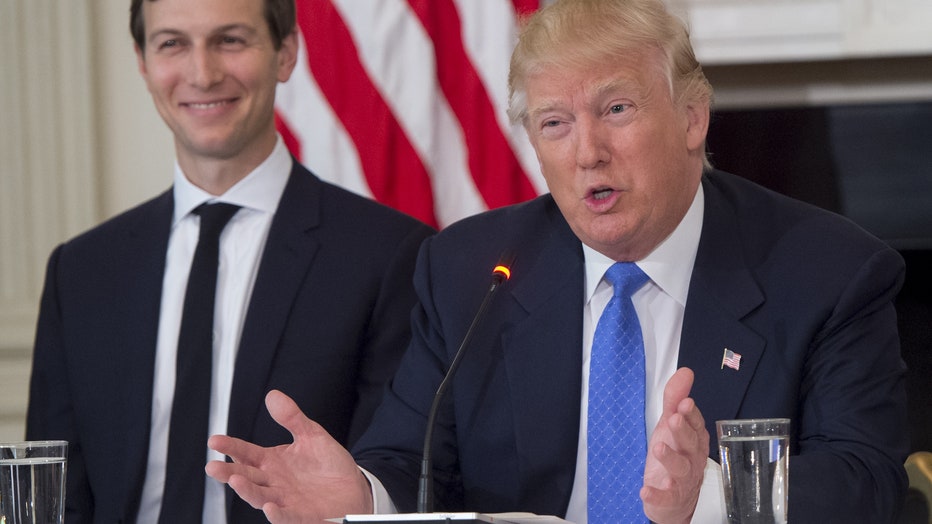Pres. Trump plans to fix government with business savvy


U.S. President Donald Trump speaks alongside White House Senior Advisor Jared Kushner (l.), during a meeting with manufacturing CEOs in the White House on February 23, 2017. (SAUL LOEB/AFP/Getty Images)
By Meg Wagner
Making the government ‘run like a great American company’
President Donald Trump is expected to unveil a new White House department on Monday — the White House Office of American Innovation — which will be tasked with overhauling the federal government by using ideas from the business sector. Pres. Trump’s son-in-law is set to lead it.
Jared Kushner, who is married to Pres. Trump’s eldest daughter and currently serves the president as a senior advisor, will oversee the office, which will be composed of a team of former financial, real estate, and other business leaders. The group will brainstorm ideas for a wide array of federal issues, from fighting drug addiction to supporting veterans.
“The government should be run like a great American company,” Kushner told the Washington Post on Sunday. “Our hope is that we can achieve successes and efficiencies for our customers, who are the citizens.”
Described by Kushner as an “offensive team,” the White House Office of American Innovation actually began work shortly after the inauguration and has already held dozens of meetings with American business leaders, an anonymous official told the Associated Press. Technology seems to be a key area of focus: The group is working with Apple CEO Tim Cook, Microsoft founder Bill Gates, and Tesla tycoon Elon Musk, although it’s unclear in what capacity.
Kushner said his team’s first effort will begin by proposing ways that Pres. Trump can follow through on a handful of his campaign promises: reforming the Veterans Administration, fighting opioid addiction, implementing a $1 trillion infrastructure plan, and overhauling U.S. workforce training. It’s possible that the incubator-like team may suggest privatizing certain areas of the government to accomplish those goals, the Post reported.
“I promised the American people I would produce results, and apply my ‘ahead of schedule, under budget’ mentality to the government,” Pres. Trump said in a statement detailing the innovation office’s plans. “All Americans, regardless of their political views, can recognize that government stagnation has hindered our ability to properly function.”
‘Drain the swamp’ and cut entire programs
Much of Trump’s presidential campaign focused on a promise to fix public problems by using ideas drawn from the private sector. “Drain the swamp” — an all-encompassing promise to fix corruption, nepotism, and incompetence in Washington — became a catchphrase, and, as a candidate, Trump frequently touted his business experience as an asset.
Earlier this month, Pres. Trump signed a vague executive order to make the government “less wasteful and more productive” by giving the Office of Management and Budget the responsibility of reorganizing the executive branch, including the authority to cut certain agencies. Critics said the order gives the White House too much power and could be a means for the administration to take down agencies it doesn’t like.
Pres. Trump’s proposed federal government budget, which came three days after the executive order, calls for $54 billion in cuts — including defunding certain programs entirely, such as the National Endowment for the Arts (a move that provoked a wave of outrage from critics who called it an attack on culture and creativity).
Pres. Trump’s spokeswoman, Hope Hicks, painted a more delicate picture of the innovation office. Instead of being a department axing-machine, she suggested to the Washington Post that the organization could serve as a way for businesses to help the federal government in areas where it is struggling. She pointed to how Trump in the 1980s helped New York City renovate the ice-skating rink inside Central Park.
“He was someone in the private sector who was able to come in and bring the resources and creativity needed and ultimately execute in an efficient, cost-effective, way,” Hicks said. “In some respects, this is an extension of some of the highlights of the president’s career.”
She did not, however, mention that the rink renovations incited a feud between Trump and the city, and Trump later reported large profits from it. Audits showed that accounting irregularities underreported revenue from the Trump-operated rink — meaning that the city lost its share of that money.
More influence amid conflict-of-interest accusations
Jared Kushner already holds significant influence in the Trump administration, and his appointment to the innovation office will cement and expand his authority. The president requested security clearance for the 36-year-old real estate investor just days after winning the election. Since then, Kushner has served as a top advisor on both foreign and domestic policy, and his duties include working on peace deal in the Middle East.
In January, the Justice Department ruled that Pres. Trump could hire Kushner as a senior White House advisor without breaking anti-nepotism laws — which bar presidents from appointing family members to top federal positions — because those rules only cover executive agency appointments and not personal White House staff.
Democrats and ethicists balked at Kushner’s appointment regardless. They said that, even without family ties to the president, Kushner has a host of other conflicts of interest. While Kushner stepped down as CEO of his family’s real estate firm, Kushner Companies, and announced that he would sell off many of his real estate assets to avoid ethical dilemmas, his investments were set to go to his mother and brother, meaning he’d still have a familial interest in the properties.
Most recently, Democratic lawmakers have questioned the Kushner family’s possible deal with a Chinese firm that plans to invest in the family’s signature midtown Manhattan skyscraper. The Kushners could make as much as $400 million off the deal.
Kushner Companies also has longstanding deals with Israeli investors, some of which had not been announced publicly until a Saturday investigation by the Associated Press. Legal experts said those deals — in addition to a personal friendship with Israeli Prime Minister Benjamin Netanyahu — could make it difficult for Kushner to serve as an unbiased broker during White House discussions with Middle Eastern heads of state.

